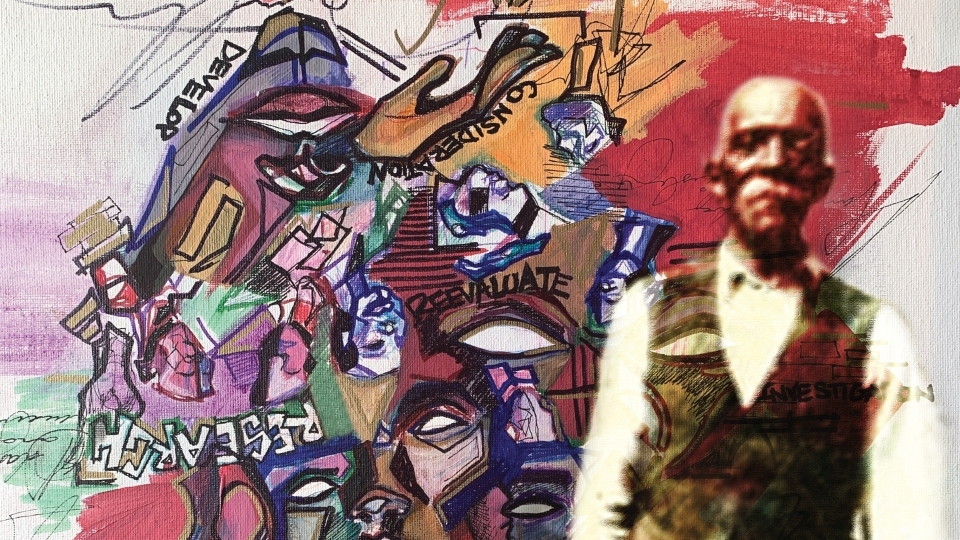Confronting Our Past: Slavery, Racism and the Quest for a Just, Humane Community
January 13, 2021
- Author
- Mary Elizabeth DeAngelis

Hiram Potts spent much of his life in service to Davidson College—not always by choice.
Hilary Green, Vann Professor of Ethics in Society, wants to know far more about Potts. She’s pored over newspaper clippings, yearbooks, court records, and census data, looking for clues to his life. A century after his death, she hopes to restore his humanity.
“What does the history of enslaved people and their descendants at Davidson College look like?” Green asks. “What can we do to tell their stories? Scholarship humanizes people. We can’t keep perpetuating a narrative that dehumanizes them.”
And all of that leads to the central question that she and her Africana Studies class have pondered since their first day together: How does the college reconcile with its past and move forward?
It’s a question the college community grapples with as it works toward a future of ending the systemic racism that began with slavery, continued through Jim Crow laws and still perpetuates America’s inequities. Many other institutions across the United States, from banks to public libraries to universities, face a similar reckoning.
The college’s Commission on Race and Slavery spent more than two years gathering details about Davidson’s participation in slavery and racist policies before making its recommendations in September. The commission included faculty, students, alumni and staff with a vast range of experience and expertise.
President Carol Quillen released the report with an apology from the Board of Trustees.
“As an institution with moral responsibility,” she said, “Davidson College affirms our commitment to acknowledge fully wrongs of the past and to act now and in the future for a just and humane campus and world.”
A Call to Action
The college’s apology comes with plans. Davidson has promised, and is in the process of:
- Mandatory antiracism training for all students, faculty and staff.
- The hiring of four tenure-track professors for Africana Studies within the next four years.
- An oral history project inviting Black alumni to share their stories of coping with racism as students.
- Art and theater productions exploring racism.
- A visiting scholar—Green—whose work centers around the lives of Black people through slavery and emancipation.
- Work with Davidson town officials on housing and economic opportunities in the Black community.
- Providing $50,000 in grants in the 2020–2021 school year for student initiatives to build an anti-racist community.
- Forming an Acknowledgement and Naming Committee of trustees, faculty and staff to recognize past wrongs and consider renaming college spaces, including Chambers Building. Maxwell Chambers, a major 19th century college benefactor, built his fortune with the work of enslaved people. The committee will also recommend spaces to commemorate the contributions of enslaved people.
"The work won’t be a quick fix solution,” says Maurice Norman ’20, the Stories (Yet) to be Told Digital Projects Fellow who supports and develops the oral history project. “Racism is embedded into Davidson as it is in many institutions.”
He urged transparency about the work ahead.
“The work will be laborious, taxing, and must be met with persistence and patience,” Norman says. “We remain accountable by continuously moving forward.”
In the classroom and in the world, students are carrying out that quest for social justice. From a Black community near Davidson to an island on the Georgia coast, students are learning and serving. They’re helping farmers, mentoring children and fighting for the environment.
“It’s listening to what people in the community say they need, it’s making meaningful connections,” says Takiyah Harper-Shipman, the John D. and Catherine T. MacArthur Assistant Professor of Africana Studies. “I think these projects are examples of what happens when the college is in service to the community.”
She said collaboration enables the college to serve as tools for the community.
“What happens if we reimagine what the college can do,” Harper-Shipman says, “and not separate research from application?’’
Read Individual Stories
Hilary Green, Vann Professor of Ethics in Society—Present Past: Scholar’s Work Brings Lives of Enslaved Persons Into Relief
Takiyah Harper-Shipman, The John D. and Catherine T. MacArthur Assistant Professor of Africana Studies—Connections: Reclaiming Crops, Preserving Land, Serving Communities
John Wertheimer, William R. Kenan Professor of History, and Thomas Espenschied, Digital Media Specialist—Beneath the Veneer: Documentary Film Probes a Heinous Crime, Justice Left Undone
Rose Stremlau, Assistant Professor of History—Here All Along: Enslaved Women and Domestic Workers Shaped Life at Davidson
Maurice J. Norman ’20, Stories (Yet) to be Told: Race, Racism and Accountability on Campus Digital Projects Fellow—Collective Memory: Surfacing and Amplifying the Stories of Black Alumni and Students
Brandon Harris ’22, Student Government Association President—Here and Now
Anthony Foxx ’93, Chair of the Commission on Race and Slavery—Hope to Heal
This article was originally published in the Fall/Winter 2020 print issue of the Davidson Journal Magazine; for more, please see the Davidson Journal section of our website.



